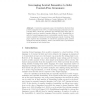Free Online Productivity Tools
i2Speak
i2Symbol
i2OCR
iTex2Img
iWeb2Print
iWeb2Shot
i2Type
iPdf2Split
iPdf2Merge
i2Bopomofo
i2Arabic
i2Style
i2Image
i2PDF
iLatex2Rtf
Sci2ools
126
click to vote
ECML
2003
Springer
2003
Springer
Leveraging Lexical Semantics to Infer Context-Free Grammars
Context-free grammars cannot be identified in the limit from positive examples (Gold, 1967), yet natural language grammars are more powerful than context-free grammars and humans learn them with remarkable ease from positive examples (Marcus, 1993). Identifiability results for formal languages ignore a potentially powerful source of information available to learners of natural languages, namely, meanings. This paper explores the learnability of context-free grammars given positive examples and lexical semantics. That is, the learner has a representation of the meaning of each lexical item.
Related Content
| Added | 06 Jul 2010 |
| Updated | 06 Jul 2010 |
| Type | Conference |
| Year | 2003 |
| Where | ECML |
| Authors | Tim Oates, Tom Armstrong, Justin Harris, Mark Nejman |
Comments (0)

